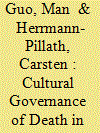| Srl | Item |
| 1 |
ID:
193770


|
|
|
|
|
| Summary/Abstract |
Using the National Civilized City Award campaign as a quasi-natural experiment, we evaluate the effect of establishing civilized cities in China on migrants' residence intention and explore its mechanism. Based on the data from the China Migrants Dynamic Survey for 2012–17 and propensity score matching and difference-in-difference approach, creating civilized cities reduced migrants' residence intention. The mechanism shows that creating civilized cities brought higher amenities while decreasing income and increasing housing costs. This effect showed individual and city heterogeneity: low-skilled and rural hukou migrants' residence intention was significantly reduced, while high-skilled and urban hukou migrants experienced no significant impact; large and midwestern cities experienced reduced attractiveness for migrants compared with small, medium-sized, and eastern cities. We show how cities affect individuals' residence intention and provide empirical evidence for the reasonable and effective formulation of urban management policies.
|
|
|
|
|
|
|
|
|
|
|
|
|
|
|
|
| 2 |
ID:
192183


|
|
|
|
|
| Summary/Abstract |
For decades, funeral reform has been a key concern for cultural governance in China as the state has attempted to manage “feudal” and “superstitious” practices and economize resources such as land devoted to cemeteries. We analyse the status of funeral reforms in Shenzhen, combining general observations with a case study of an urban village. We show how the business of funeral service providers mediates between cultural governance and grassroots-level needs and demands, resulting in distinct forms of ritual hybridization. In the case of native villagers, we observe the bifurcation of rituals at the central municipal parlour and at the home of the deceased. For understanding the adaptability of death rituals under the regime of cultural governance, it is essential to distinguish between funeral rites and their modular structure on the one hand, and rites for the disposal of the body on the other.
|
|
|
|
|
|
|
|
|
|
|
|
|
|
|
|